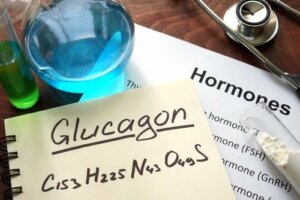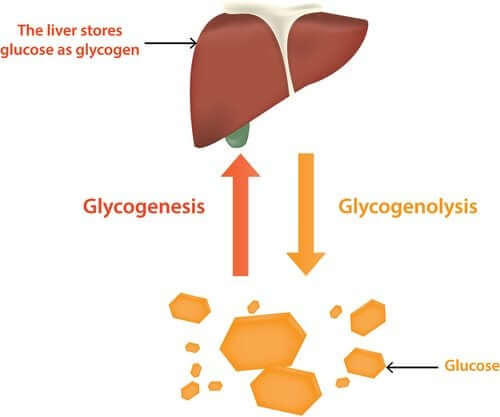What Is Glucagon? What Are Its Functions?

Glucagon is a hormone that the body naturally produces, specifically in an organ called the pancreas. Its main function is to increase blood glucose levels, which is the opposite effect of insulin.
Due to this property, as we’ll explain ahead, people who suffer from cases of hypoglycemia (low levels of glucose in the blood) widely use glucagon. Specifically, it’s used in cases where the patient has lost consciousness and is unable to swallow food.
Doctors advise all patients who suffer from diabetes to always carry a bottle of glucagon with them, especially those patients who are insulin dependent. Furthermore, they should teach someone close to them how to administer it so that they’ll know how in case of an emergency.
Glucagon’s functions in the body

Due to its mechanism of action, glucagon triggers a series of different effects and processes in the body’s organs. Among its effects, we’ll mention the following:
- Metabolic: Glucagon is involved in metabolic chemical reactions. It induces the catabolism of glycogen in the liver. In other words, it increases the breakdown of glycogen molecules to produce glucose.
- Cardiac: It produces what’s known as the beta effect. That is, positive inotropic and chronotropic effects similar to beta-adrenergic agonist medications. An inotropic substance is one that increases the heart’s ability to contract. Substances that have the ability to affect heart rate have a chronotropic effect.
- Smooth muscle: Glucagon causes an acute relaxation of the intestinal muscle.
- Increases the concentration of catecholamines.
- As we’ve mentioned, it increases the body’s release of insulin. This allows the cells to assimilate the glucose transporter (GLUT4), and they can use the glucose formed during the process of hepatic gluconeogenesis, that is, the process of synthesizing glucose.
Regulation of glucagon
The main factor that regulates levels of glucagon in the blood is blood glucose level. When blood glucose is low, a direct signal is sent to the alpha cells, which are the pancreatic cells that synthesize this hormone. This action is blocked by the effect of insulin. Therefore, glucagon and insulin have opposite effects.
Amino acids also raise glucagon levels. However, the effect is lower than the effect triggered by glucose. The fact that amino acids also raise glucagon is important, since people can avoid a hypoglycemic episode triggered by ingesting too much protein.
Other substances that also increase the secretion of glucagon are:
- Catecholamines
- Human-growth hormone
- Glucocorticoids: They do this both directly and indirectly, since their action causes an increase of amino acids in plasma.
On the other hand, free fatty acids produce the opposite effect. In this sense, they have an inhibitory effect on the secretion of glucagon.
Also read: What Are The Differences Between Glucose and Fructose?
Learning more about hypoglycemia

As you probably know, hypoglycemia is a disorder characterized by low blood glucose (blood sugar) levels. For many who suffer from diabetes, this means having a blood sugar level below 70 milligrams per deciliter. However, this number can vary, so you should consult with your doctor.
The symptoms of hypoglycemia tend to have a sudden onset, and can vary from one person to another. Additionally, different people can experience the same symptom to a different degree, and others will have no symptoms at all.
Among light to moderate symptoms of hypoglycemia, we’ll point out the following:
- Tremors
- Excessive sweating
- Increased appetite
- Sleepiness
- Paleness
- Changes in behavior or personality
- Lack of coordination
Moreover, if the case of hypoglycemia is severe, characteristic symptoms are:
- Loss of appetite
- Convulsions
- Loss of consciousness
You might enjoy reading: Tips on Improving the Health of Your Pancreas
Conclusion
Glucagon is a hormone that’s synthesized in the pancreas. Its main function is to increase glucose levels in the blood. If you’re diabetic, you should talk to your doctor about possibly taking a dose of this hormone with you wherever you go in case there’s an emergency situation and you need someone to administer it to you.
https://mejorconsalud.as.com/glucagon-que-es-y-para-que-sirve/
All cited sources were thoroughly reviewed by our team to ensure their quality, reliability, currency, and validity. The bibliography of this article was considered reliable and of academic or scientific accuracy.
- Jiang, G., & Zhang, B. B. (2003). Glucagon and regulation of glucose metabolism. American Journal of Physiology – Endocrinology and Metabolism.
- Furman, B. L. (2007). Glucagon. In xPharm: The Comprehensive Pharmacology Reference. https://doi.org/10.1016/B978-008055232-3.61831-8
- Taborsky, G. J. (2010). The physiology of glucagon. In Journal of Diabetes Science and Technology. https://doi.org/10.1177/193229681000400607
This text is provided for informational purposes only and does not replace consultation with a professional. If in doubt, consult your specialist.








